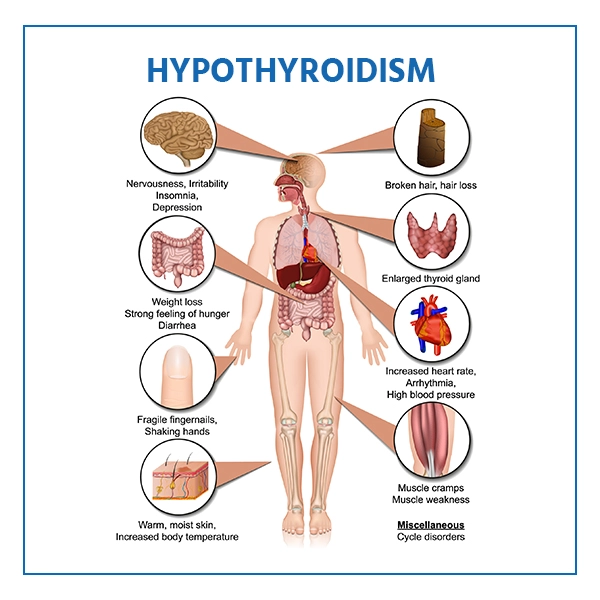Knowledge
Understanding Hypothyroidism: Causes, Symptoms, and Treatment
What is Hypothyroidism?

Hypothyroidism, a common endocrine disorder, occurs when the thyroid gland fails to produce adequate thyroid hormones. These hormones are essential for regulating metabolism and maintaining the body’s overall health. If left untreated, hypothyroidism can lead to a range of complications. In this article, we will delve into the causes, symptoms, diagnosis, and treatment options for hypothyroidism, shedding light on this often misunderstood condition.
1. Causes of Hypothyroidism:
The primary cause of hypothyroidism is Hashimoto’s thyroiditis, an autoimmune disorder in which the body’s immune system mistakenly attacks the thyroid gland, causing inflammation and hindering hormone production. Other causes include:
- Thyroid Surgery: Partial or total removal of the thyroid gland due to thyroid cancer or other thyroid-related issues.
- Radiation Therapy: Treatment for head and neck cancers may damage the thyroid gland and lead to hypothyroidism.
- Iodine Deficiency: Inadequate intake of iodine, a crucial mineral required for thyroid hormone synthesis, can contribute to hypothyroidism.
- Medications: Certain medications, such as lithium, interferon alpha, and amiodarone, can interfere with thyroid hormone production.
- Congenital Factors: Some infants are born with an underdeveloped or absent thyroid gland, leading to congenital hypothyroidism.
2. Recognizing the Symptoms:
The symptoms of hypothyroidism can vary in severity and may develop gradually, making early detection challenging. Common signs and symptoms include:
- Fatigue and Weakness: Feeling tired even after getting enough sleep, and experiencing muscle weakness.
- Unexplained Weight Gain: Despite a healthy diet and exercise, individuals with hypothyroidism may struggle to manage their weight.
- Cold Sensitivity: Increased sensitivity to cold temperatures and difficulty staying warm.
- Dry Skin and Hair: Skin may become dry, itchy, and hair can become brittle and prone to thinning.
- Constipation: Sluggish thyroid function can slow down the digestive system, leading to constipation.
- Depression and Mood Swings: Hypothyroidism can impact mood and lead to feelings of sadness or irritability.
- Menstrual Irregularities: Women with hypothyroidism may experience irregular menstrual cycles or heavy periods.
- Memory Problems: Difficulty concentrating and memory issues can be associated with hypothyroidism.
3. Diagnosis and Testing:
If you suspect you may have hypothyroidism, a healthcare professional will perform a series of tests, including:
- Thyroid Function Tests: Blood tests to measure levels of thyroid-stimulating hormone (TSH), thyroxine (T4), and triiodothyronine (T3).
- Antibody Tests: To check for the presence of thyroid antibodies, particularly in cases of suspected autoimmune thyroiditis.
4. Treatment and Management:
Hypothyroidism is a manageable condition, and treatment involves hormone replacement therapy. The most common treatment is the daily intake of synthetic thyroid hormone medication, usually in the form of levothyroxine. The dosage is adjusted based on individual needs, and regular check-ups are necessary to monitor thyroid hormone levels and make necessary adjustments.
5. Living with Hypothyroidism:
In addition to medication, lifestyle changes can improve the management of hypothyroidism. A balanced diet rich in iodine, selenium, and zinc can support thyroid function. Regular exercise helps boost metabolism and enhances overall well-being. Stress management techniques can also be beneficial, as stress may exacerbate symptoms.
Conclusion:
Hypothyroidism is a prevalent condition that can significantly impact one’s quality of life if left untreated. Early recognition, proper diagnosis, and consistent medical management through thyroid hormone replacement therapy can help individuals with hypothyroidism lead healthy and fulfilling lives. If you suspect you have hypothyroidism or experience any related symptoms, it’s crucial to consult a healthcare professional for a thorough evaluation and personalized treatment plan.
(Note: Always consult with a healthcare professional for personalized advice and treatment for any medical condition, including hypothyroidism.)


